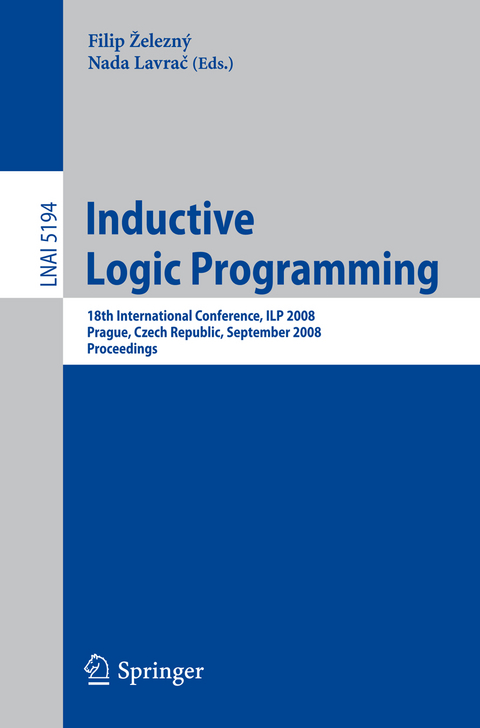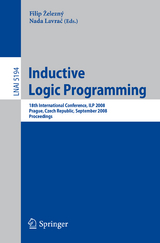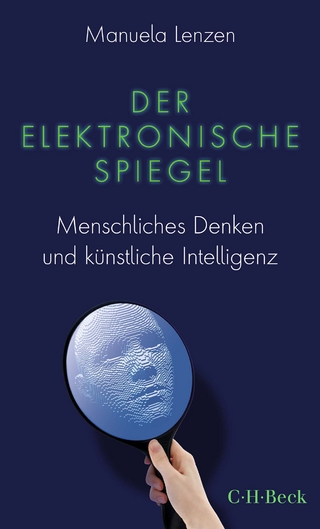Inductive Logic Programming
Springer Berlin (Verlag)
978-3-540-85927-7 (ISBN)
Prof. Dr. Nada Lavrac heads the Department of Knowledge Technologies at the Jo ef Stefan Institute in Ljubljana. She is the author and editor of several books and proceedings in the field of data mining and machine learning, and she has chaired or served on the boards of the main related journals and conferences. Her research interests include machine learning, data mining, and inductive logic programming, and related applications in medicine, public health, bioinformatics, and the management of virtual enterprises. In 1997 she was awarded the Ambassador of Science of Slovenia prize, and in 2007 she was elected as an ECCAI Fellow.
Invited Talks.- Building Theories of the World: Human and Machine Learning Perspectives.- SRL without Tears: An ILP Perspective.- Semantic Web Meets ILP: Unconsumated Love, or No Love Lost?.- Learning Expressive Models of Gene Regulation.- Information Overload and FP7 Funding Opportunities in 2009-10.- Research Papers.- A Model to Study Phase Transition and Plateaus in Relational Learning.- Top-Down Induction of Relational Model Trees in Multi-instance Learning.- Challenges in Relational Learning for Real-Time Systems Applications.- Discriminative Structure Learning of Markov Logic Networks.- An Experiment in Robot Discovery with ILP.- Using the Bottom Clause and Mode Declarations on FOL Theory Revision from Examples.- DL-FOIL Concept Learning in Description Logics.- Feature Discovery with Type Extension Trees.- Feature Construction Using Theory-Guided Sampling and Randomised Search.- Foundations of Onto-Relational Learning.- L-Modified ILP Evaluation Functions for Positive-Only Biological Grammar Learning.- Logical Hierarchical Hidden Markov Models for Modeling User Activities.- Learning with Kernels in Description Logics.- Querying and Merging Heterogeneous Data by Approximate Joins on Higher-Order Terms.- A Comparison between Two Statistical Relational Models.- Brave Induction.- A Statistical Approach to Incremental Induction of First-Order Hierarchical Knowledge Bases.- A Note on Refinement Operators for IE-Based ILP Systems.- Learning Aggregate Functions with Neural Networks Using a Cascade-Correlation Approach.- Learning Block-Preserving Outerplanar Graph Patterns and Its Application to Data Mining.
| Erscheint lt. Verlag | 5.9.2008 |
|---|---|
| Reihe/Serie | Lecture Notes in Artificial Intelligence | Lecture Notes in Computer Science |
| Zusatzinfo | X, 358 p. |
| Verlagsort | Berlin |
| Sprache | englisch |
| Maße | 155 x 235 mm |
| Gewicht | 569 g |
| Themenwelt | Informatik ► Theorie / Studium ► Künstliche Intelligenz / Robotik |
| Schlagworte | Algorithm analysis and problem complexity • Algorithmic Learning • Bayesian networks • biological grammar induction • Classifier SYstems • Clustering • Data Mining • decision-tree learning • Efficiency • generalisation operators • graph mining • graph structured pattern • Hardcover, Softcover / Informatik, EDV/Informatik • HC/Informatik, EDV/Informatik • Higher-Order Logic • I • implementation • Inductive Inference • Inductive Logic Programming • inductive processes • Knowledge Discovery • lazy learning • Learning theory • Logic Programming • machine learning • Markov logic networks • Meta-learning • Minimum description length • multirelational data mining • Pattern Discovery • Performance • Process Mining • Randomization • relational learning • Statistical Learning • Support Vector Machines • symmetry |
| ISBN-10 | 3-540-85927-6 / 3540859276 |
| ISBN-13 | 978-3-540-85927-7 / 9783540859277 |
| Zustand | Neuware |
| Haben Sie eine Frage zum Produkt? |
aus dem Bereich




